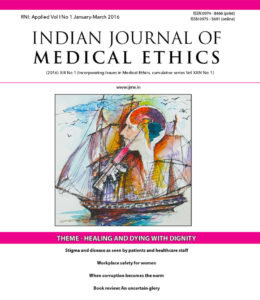
If one were ill with a painful incurable disease, would one want to choose a quick death, or prefer to carry on existing? Or leave the decision to family members or doctors, to fate or the courts? Is any sort of moral or physical support available for family members of the terminally ill? These and other complex questions are discussed in our theme section, guest-edited by Sunita Bandewar, with a view to opening them up to greater debate in the wider context of emotional, social, legal, and religious perspectives. This subject was centre-staged recently with the death of Aruna Shanbaug, the nurse whose life was so brutally misshapen into a vegetative existence for over 40 years. A commentator examines the closely linked issue of women’s lack of safety at work, especially that of nurses exposed by the very public nature of their work to abuse.
A research study focuses on the important question of stigma related to certain diseases, and another on that of patients’ rights as seen by patients themselves. A commentator lays bare the corruption prevalent in our healthcare system. We also have a critical response to the central government’s declared plan to create another healthcare council. Finally, editors of several leading biomedical journals have come together on behalf of the Indian Association of Medical Journal Editors, for a joint editorial critically examining the attempt of the Medical Council of India to regulate academic publication for the purposes of promotion. IJME was one of the first journals to criticise this step in its October issue. All this, plus thoughtful reviews and letters, as we wish our readers a rewarding and happy 2016.
Cover credit: Original painting entitled Euthanasia, courtesy of the artist, Saravanan Perumal
